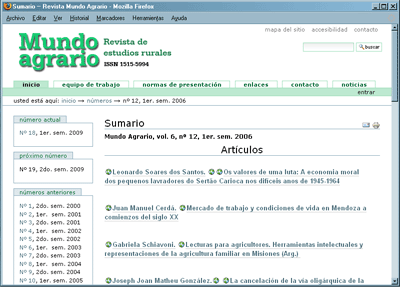La cancelación de la vía oligárquica de la gran irrigación en México: Sinaloa (1908-1936)
Main Article Content
Abstract
The objective of this work is to show the possibilites that offers the documentation preserved in the Archivo Histórico del Agua to approximate the growing implication of Mexican State into the process of agrarian modernization, through an irrigation foment policy, during the first third of the XXth century. To achieve this goal we began from the characterization of the agro-exporting model implemented in Mexico between 1877 and 1930. After that we make a synthesis os the agropecuarian sector in Sinaloa State during that same period. Next, its emphasized the initial spectations that the oligarchy had over the big irrigation in Sinaloa from the study, mainly macroeconomic, of the three enterprises that take a contract of subvention with the federal government at the end of the Porfiriato. And, at least, from the following of this same cases, its made clear the motives that let us understand the progressive lost of legitimacy, after the revolutionary period of 1910, of that modernizing model of the agro "from the top" with public support to its end.
Downloads
Download data is not yet available.
Article Details
How to Cite
Mateu González, J. J. (2006). La cancelación de la vía oligárquica de la gran irrigación en México: Sinaloa (1908-1936). Mundo Agrario, 6(12). Retrieved from https://www.mundoagrario.unlp.edu.ar/article/view/v06n12a04
Issue
Section
Artículos
Works are released under a Creative Commons License (Creative Commons 4.0. Atribución-NoComercial-CompartirIgual) which provides unrestricted use, copy and redistribution in any medium or format and remix, transform and build upon the original work properly cited. The Creative Commons License stipulates that: "You must attribute the work in the manner specified by the author or licensor (but not in any way that suggests that they endorse you or your use of the work)."
